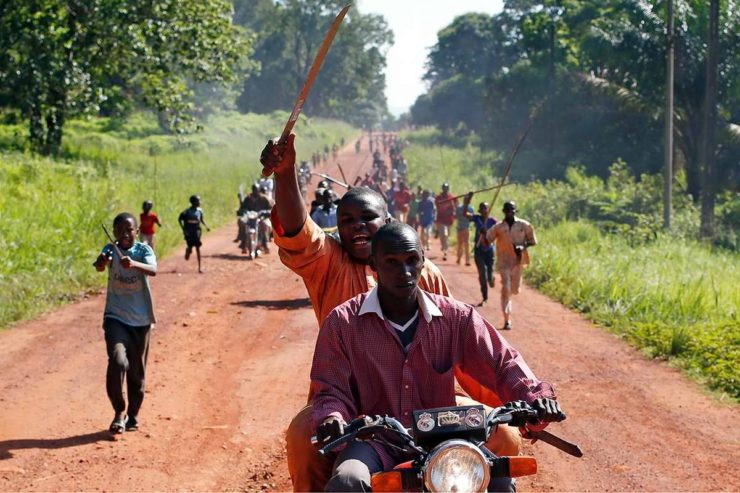
There is now an unequivocal scientific consensus that political, economic, social and cultural issues in Sub-Saharan Africa must be viewed through the prism of ethnicity. This hypothesis is supported by the multi-ethnicity characteristic of most of the states in the region and the rich empirical base of inter-ethnic conflicts and contradictions based on the study of East, Tropical and Southern Africa. Nevertheless, with regard to the territory of the former Western Sudan and, according to some data, some other areas of the African continent, it is appropriate to speak of a significant levelling of the importance of ethnicity in the consideration of various forms of social relations. The reason for this is a little-studied but apparently extremely important phenomenon. It is about jamu names and the relations existing between them, first of all, of equivalence and joking kinship.
The study of the phenomenon of jamu began only in the 20th century and was closely connected with M. Deliafos’s three-volume work “Upper Senegal-Niger”, which interpreted jamu as kinship relations with some social and political significance. Moss’s use of the term “joking kinship” (sinankuya), under which the scholar understood a kind of mechanism for relieving tensions and preventing conflicts, was no less important for identifying the key features of the political culture of West African countries. It seems necessary to note that jamu relations, friendly in their meaning, are encased in a shell of hostility and thus characterised by “the opposite of expression and content”. For example, when meeting one’s sinanku (joking relative), it is customary to show hostility, which may be expressed in insults, joking or even inversion of subordination (“you are my slave, I am your master”). At the same time, the social status of individuals and age are relegated to the background.
According to a number of researchers, the emergence of Jamu clan names is closely connected with the emergence in the 3rd century B.C. and further development in the territory of modern Mali of the city of Djenne, which, unlike large settlements in Europe and the Middle East, had no elements of vertical structure, such as a citadel and a main temple. This fact with a certain degree of assumption allows us to speak about the absence of institutionalised hierarchy in the society of Djenne, which was a huge, by the standards of that time, agglomeration with a population reaching 50 thousand people in the period of its greatest prosperity (450 AD). There were 69 satellite settlements around Djenne, each of which was equally included in the socio-economic life of the city, forming an ecosocial network of equal members.
The existence of such an apparently stable and pluralistic system was complemented by a surprising, if not unique, feature of Jenne – the absence of internal ethnic and religious conflicts. This paradox is noted by domestic researcher P.A. Kutsenkov, pointing out that “the foundation of West African civilisation was originally laid on a certain mechanism of conflict resolution, which changed over time, but never ‘broke down'”. This mechanism should be understood as the system of jamu clan names and relations between them.
What is a jamu nowadays? Today they are passport surnames (Keita, Coulibaly, Konate, Kamara, Kone, etc.) of the inhabitants of most West African states. It is important to note that within the historical process, the Jamu are not organised communities, but at the same time, they perform an extremely important function. In fact, relations of “joking kinship” in West Africa are a peculiar way of marking zones of potential and real conflicts between groups and sublimating them by translating them into a carnival form. It is not without reason that sanankouya is intensively (and, admittedly, effectively) exploited by the Malian authorities: “mock kinship” is regarded at the highest political level of the country as a serious means of preventing inter-ethnic tensions. Moreover, the jamu system favours the formation of a unified political space, which is also confirmed by surveys: Malians mostly identify themselves with both the state and their group, or primarily with the state. The explanation lies in the fact that joking kinship relations (sinankuya) strongly bind the different groups, forming a system of interdependent elements. In 2010, the renowned American political scientists Dunnig and Harrison analysed the impact of kinship relations on the political preferences of Malians through surveys. Without going into details, it should be emphasised that the results make it possible to establish the primacy of the role of jamu ties (equivalence, sinankuya) rather than the ethnicity of candidates: respondents were more likely to vote for their sinankuya than for members of their ethnic group who did not have jamu ties with them.
Unfortunately, the phenomenon of jamu and joking kinship remains extremely understudied in both domestic and foreign African studies. The reasons for this state of affairs should be considered to be the problems associated with the collection of empirical data and their verification, as well as the impossibility to consider these phenomena outside the socio-political context, which includes a number of other informal practices, such as ethnic sentiments.
Ivan KOPYTZEV – political scientist, research intern at the Centre for Middle Eastern and African Studies, Institute for International Studies, MGIMO, Russian Ministry of Foreign Affairs, especially for online magazine “New Eastern Outlook”.
